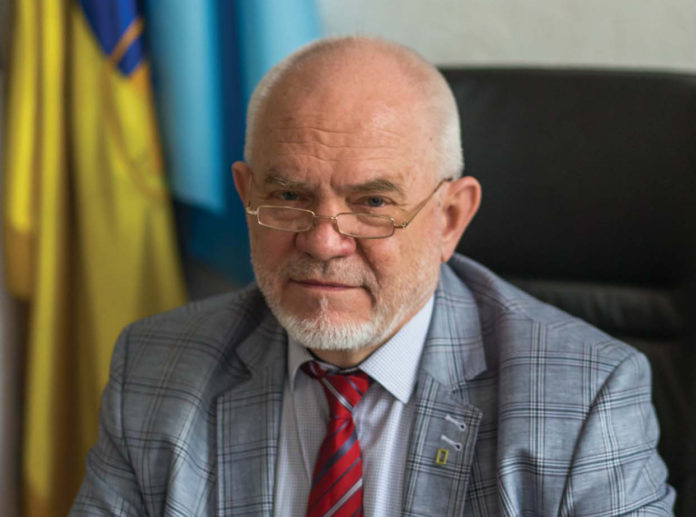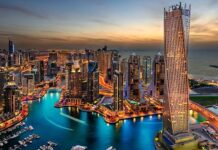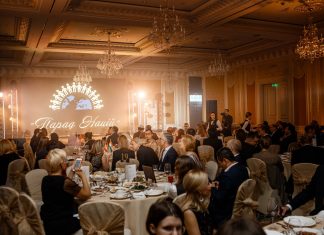Volodymyr Kazarin, Rector, Doctor of Philology, Professor and Honoured Worker of Education of Ukraine, in an exclusive interview for FD has been telling the story of the University that had to become a refugee and about the trials that harden the higher educational institution.
When have you finally moved to the continental part of Ukraine from the occupied Crimea?
– It happened in 2015. The Parliament members elected in Crimea – Kunitsyn, Jemilev, Chubarov and Denisova – helped us very much so.
They gave us a piece of a good advice – to write a letter to the Parliament members and to make them ask the President to help us to settle down in Ukraine. And we did it. Nine Parliament members supported our letter. They had asked the President to help and in August the President ordered the Prime-Minister to organize the transfer of the V. I. Vernadsky Taurida National University as fast as possible. Sure, we must thank our fathers-founders – because when Vernadsky and his colleagues retreated from the Communists that had occupied Crimea, they were wise enough to found our University as an affiliate University of the Saint Volodymyr University of Kyiv, that nowadays is named after Taras Shevchenko. Due to this historical fact we have got an opportunity to work at the capital. In fact, we have come back home. In 1918 Vernadsky initiated three historical deeds – he founded Academy of Science of Ukraine, The Central Library and our University that has been celebrating its 100th Anniversary this year.
Have you started a complete educational process yet?
– We have got everything that is necessary to start it. In 2016 we realized the first entering campaign. 236 students entered then the first year of studies at the departments that were financed by the state and at the department of the extraordinary studies. Young people from the occupied territories – from Crimea and from Donbass – study at our University. Now we have more than 460 teachers and more than three thousand students. During eight months we had been working as volunteers and since July 2016 we have got money. We have renovated the activity of all the faculties and we even have set new specialties up. Also, we play a role of the ambulance for those higher learning establishments from Donetsk that had been evacuated from the war zone and suffer through the problems of renovation. In particular, we have included into our University structure the Musical Academy of Donetsk. Ministry of Science and Education has asked us about this.
We do not want to be a burden for Ukraine.
We have suffered through the catastrophe of occupation and we have known the way to evade such catastrophes in the future. We are ready to instruct the new specialists – the people with the new vision. In addition we have been setting up the Scientific Park named after V.I. Vernadsky.
Viktor Yushchenko being the President of Ukraine adopted a very nice law that foresaw the creation of the scientific parks and their main aim was to commercialize the scientific inventions. We have renovated the relations with the 12 leading universities of the world we had had before the occupation and we have concluded the treaties of cooperation with 20 foreign universities.

Is there anything you do not like in the actual educational system?
– I was taken by surprise with the decision to disband the Diplomatic Academy of the Ministry of Foreign Affairs of Ukraine. I understand that diplomacy needs to be re-cultivated and that is why such decision sounds at least rather strange. Our university has the entire base that is necessary for the restoration of such Academy.
The problem is only one – to attract highly qualified diplomatic personnel to teach. There are many sophisticated diplomats in Ukraine but, unfortunately, all of them are not at work. But this process has to be innovative, and it should be, as well as less obsolete and less detached from life.
Please tell us which directions the Taurida University can offer to its future student?
– We have the classical university. In addition to the mathematics and natural sciences, we had three types of philology – Slavic, Romano-Germanic and Oriental that also included the study of the Crimean Tatar language. Also, we have serious training in cultural studies and geography that we call “the science of land.”
There is also a very large faculty of physical culture and Olympic sports, because Crimea has always been a sports ground for the whole country – especially in the winter. We want to be useful to Kyiv for the fact that it created us once and accepted us, because we are a university with a tragic fate.
So, it is possible to say that any structure being undisturbed does not have any development and the catastrophe and transformation are required to speed the development up?
– As a historian I must note that all the outstanding philosophers, starting with Confucius and up to our compatriot Hrihoriy Skovoroda, believed that catastrophe gives the new opportunities. Any crisis foresees new horizons. Our crisis has been provoked by the occupation – but we had realized that our university system had been a backward one, had not it? In Poland there are from 50 till 70 thousand of Ukrainian students that have understood the backwardness of our Universities and have made their minds up to study in Poland.
So, we need to be quickly and qualitatively rebuilt.
Does the Ministry of Science and Education support you? Do you plead for this Ministry?
– The Ministry is run by Liliya Grinevich. She does a lot but she has faced a vast space that needs reform. Her eff orts, at the moment, are aimed primarily at reforming of the secondary school, as it is a basis for everything, including the high school. However, in 2014, the “Law on Higher Education” was elaborated, and this law was proclaimed as the most important one – it proclaimed the autonomy of universities. It says that the universities develop their own staffing schedule by themselves. Unfortunately, this law often confronts the existing bureaucratic system. But I think that in two years we will achieve the introduction of this law into a real act. It has already been implemented legally; it is in need to be implemented in practice.
How many foreign students do study at your university since you have moved to Kyiv?
– In Crimea, we had, usually, about two thousand foreign students. In particular, we were among the first ones that started the teaching of the students from China. Also, we had students from Africa and Latin America. Since we have moved to Kyiv, we started to restore it. Last year we had about 50 foreigners. This year here should be about 150 of them.
Is it possible for a foreign student to enter the department that is financed by the state at your university?
– No, according to the law, foreigners can study only upon the basis of the contract.
Do you consider such opportunity?
– Sure, we do, because this is a mistake of Ukrainian part. This is a manifestation of the weakness of our state, because we consider our state as a poor one (though it is not so) and we try to economize without any reasons. The opportunity for the foreigners to study at the department financed by the state is a prestige of the country. China, for example, has introduced a large number of scholarships for foreigners and it works.
Does your university cooperate with powerful business structures?
– We have introduced a wide range of cooperation with similar structures – in Ukraine and abroad as well. This cooperation has been working and therefore it has to bear its fruits.
 Which activities do you plan for the 100th anniversary of the University?
Which activities do you plan for the 100th anniversary of the University?
– This year we have three jubilees – besides our University’s one, I mean the Academy of Sciences and the Library of the Academy of Sciences anniversaries. We have a long series of events. In particular, our next Ukrainian expedition went to our V.I. Vernadsky research station and we had handed them with the flag of our university and with the gifts. We are preparing a series of scientific conferences, one of them will be held soon at the Library named after V. I. Vernadsky. There will be commemorative events for students. There will be sports competitions. There will be a commemorative coin, envelope and brand. But the most important event will be the opening of the Scientific Park named after Volodymyr Ivanovych Vernadsky.
Tell us about the teachers that work at your university now and about the plans for the future?
– Our teachers are highly qualified specialists. Most of them are our Crimean teachers. But I want Turkish, Chinese, American and European professors to teach at our University.
The University has been planning the further structural changes. The Crimean universities that are still in the occupied territory are planning to enter our university structure. The strategic goal of our university for the next 10 years is to build a new innovative system of higher education and to become one of the best universities in Europe and in the world.
The new system will be based on a fundamentally different approach (from the Soviet one) of teaching and learning.
Students, like in Europe, will be able to choose the academic load of the main disciplines by themselves, to choose the number and intensity of additional special courses that will optimize the time spent for the secondary education topics, to improve the quality of the knowledge that had been gained and to increase the variability of education.
And I hope that we will succeed.
We have all the reasons to look confidently at the future.













